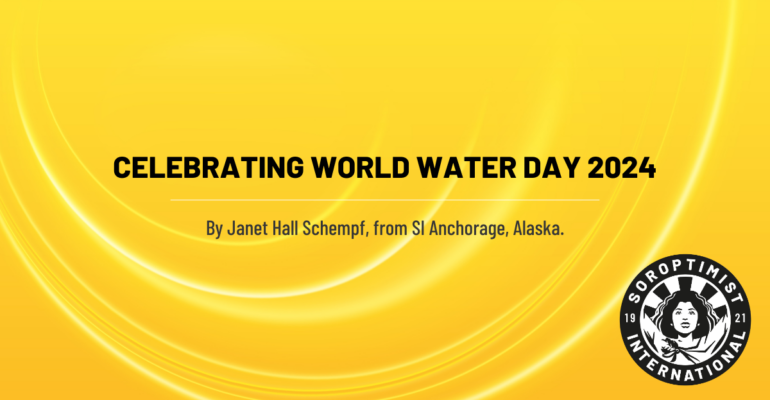Blog of Janet Hall Schempf, from SI Anchorage, Alaska.
In 1993, the United Nations (UN) General Assembly declared 22 March of each year World Day for Water. This day is set apart to raise awareness and appreciation of “the supply and quality of fresh water” and to promote water conservation and sustainable management.
The importance of World Water Day to UN agencies is reflected in the comments by UN Secretary-General António Guterres, in his World Water Day message, who emphasised the urgent need for increased transboundary water cooperation:
“Water for peace is the theme of this year’s World Water Day. Achieving it relies on far greater cooperation. Today, 153 countries share water resources. Yet only 24 have reported cooperation agreements for all their shared water. We must accelerate efforts to work together across borders, and I urge all countries to join and implement the United Nations Water Convention – which promotes managing shared water resources sustainably.“
The flagship event of World Water Day 2024 took place in Geneva. Two World Water Day events were held at UN Headquarters: Celebrating World Water Day 2024: Converging Efforts, Keeping the Momentum of Progress and Leveraging Water for Peace. In addition, Rick Connor, Editor-in-Chief of the UN World Water Development Report 2024, held a media event at UN HQ.

Celebrating World Water Day 2004
The high-level event, Celebrating World Water Day 2024: Covering Efforts, Keeping the Momentum of Progress, was organised to consider a set of issues related to the water agenda, especially implementation of voluntary commitments received during the UN Water Conference 2023, as well as applications of established international water-related platforms. Country representatives, UN entities, financial institutions, international organisations, academia, civil society, the private sector, and other stakeholders participated with speeches, videos, and panel discussions.
The ceremonial portion of the event included prepared remarks by H.E. Mr. Dennis Francis, President of the 78th session of the General Assembly.
H.E. Mr. Sirojiddin Muhriddin, Minister of Foreign Affairs of Tajikistan, emphasised the importance of responding to the problems related to access to drinking water, timely implementation of coordinated international measures, and the significance of collective cooperation.
H.E. Prof. Dwikorita Karnawati, Minister for Meteorology, Climatology and Geophysics, and Permanent Representative of the Republic of Indonesia to the World Meteorological Organisation, spoke about water justice, water stress, inadequate access, the intersection of water, weather, and climate, and UN Water Conference 2023.
H.E. Jaap Slootmaker, Vice Minister for Infrastructure and Water of the Kingdom of the Netherlands, noted that the global water cycle is unstable, and that demand must be managed while preserving ecosystems. She reminded attendees of the commitments of Water Action Agenda 2023, published and expressed by members, especially those concerning agriculture, equal access, financial budgets at all levels of government, and the Sustainable Development Goals (SDGs). She indicated more commitments are expected in September 2024, when the “Global Commission on the Economics of Water” report will be released. Ms. Slootmaker presented information about the LIVING DATABASE at UN DESA.
The second part of Celebrating World Water Day was panel presentations. The first introduced the World Water Development Report 2024, Water for Prosperity and Peace, to the New York audience. This report, edited by Rick Conner, explains that demand for water is rising and that one-half of the world’s population lives in areas with severe water scarcity. Some highlights of the report:
>>> 2 billion people are without access to safely managed drinking water.
>>> 80% of jobs in low-income countries are water-dependent
>>> There is no clear relationship between a country’s per capita GDP and its water availability.
>>> Wind and solar-photovoltaic (PV) production have more than doubled between 2011 and 2019.
Another panel presentation was UNICEF’s launch of WASH for Peace: Conflict Sensitivity and Peacebuilding Guidance and Tools for the WASH Sector. UNICEF’s approach to peacebuilding is child rights-based, and aims to address the root causes and effects of violent conflict. To this end, WASH for Peace is a set of stand-alone resources for water, sanitation, and hygiene projects and programs operating in conflict and fragile settings.
The next panelist spoke about the state of global water resources, and showed a graphic of projected drought on a global scale. At this time, more than 50% of the globe is “not normal,” extreme floods and droughts are increasing, and glaciers are melting at a record rate, which in turn accelerates rising sea levels. An early warning system is conceived that puts water at the center of climate action and provides a flash-flood guidance and early warning systems for floods.
Another panelist spoke about the key messages from UN Water Conference 2023 and the 10th World Water Forum, with the expectation of a Ministerial Declaration.
The World Bank updated everyone on its revised mission and its focus impact with a set of “challenge programs.”
Member states were invited to comment. Some appreciated the “concrete proposals” brought forth by the panelists and mentioned the anticipated UN Envoy for Water. However, one representative stated that no new institutions and processes are needed, that the existing are effective. He further objected to “water for peace” and to anything that looks like a risk to sovereignty, and he said that he objects to the proposed UN Water Envoy, who must meet certain criteria if appointed. This same member affirmed responsible management of water resources that foster international cooperation.
In summary, the speakers emphasised that implementation of the UN Water Conference 2023 outcomes must be completed via global platforms, including the upcoming 10 World Water Forum to be held by the Indonesian Government in Bali, on May 18-25, 2024. While the advantages of country-to-country cooperation on transboundary water issues are obvious, comments were made about national sovereignty.

